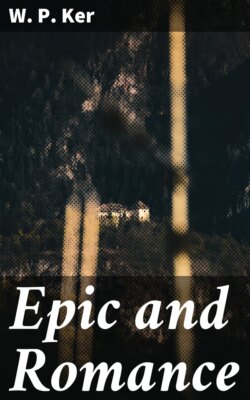Читать книгу Epic and Romance - W. P. Ker - Страница 12
На сайте Литреса книга снята с продажи.
Romantic Mythology
ОглавлениеTable of Contents
| Mythology not required in the greatest scenes in Homer | 35 |
| Myths and popular fancies may be a hindrance to the epic poet, but he is compelled to make some use of them | 36 |
| He criticises and selects, and allows the characters of the gods to be modified in relation to the human characters | 37 |
| Early humanism and reflexion on myth—two processes: (1) rejection of the grosser myths; (2) refinement of myth through poetry | 40 |
| Two ways of refining myth in poetry—(1) by turning it into mere fancy, and the more ludicrous things into comedy; (2) by finding an imaginative or an ethical meaning in it | 40 |
| Instances in Icelandic literature—Lokasenna | 41 |
| Snorri Sturluson, his ironical method in the Edda | 42 |
| The old gods rescued from clerical persecution | 43 |
| Imaginative treatment of the graver myths—the death of Balder; the Doom of the Gods | 43 |
| Difficulties in the attainment of poetical self-command | 44 |
| Medieval confusion and distraction | 45 |
| Premature "culture" | 46 |
| Depreciation of native work in comparison with ancient literature and with theology | 47 |
| An Icelandic gentleman's library | 47 |
| The whalebone casket | 48 |
| Epic not wholly stifled by "useful knowledge" | 49 |
